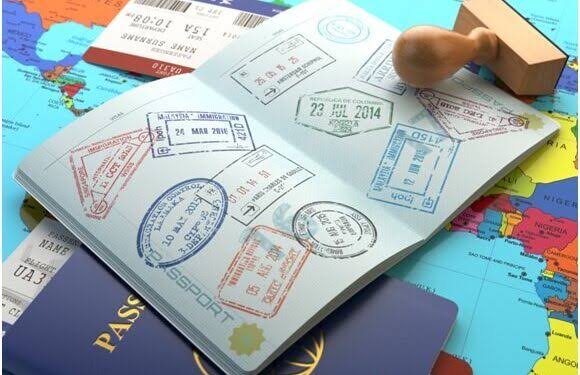• UK begins issuance of eVisa for Nigerian, Pakistan students, workers
From Juliana Taiwo-Obalonye, Abuja and Bimbola Oyesola
The Federal Government has reaffirmed its commitment to resolving the visa dispute with the United States and United Arab Emirates (UAE) through diplomatic engagement.
It also reiterated its unwavering commitment to strengthening longstanding cordial diplomatic relations with the governments of both countries.
In a statement by presidential spokesperson, Mr. Bayo Onanuga, President Tinubu said the reassurance followed recent adjustments in visa issuance policies affecting Nigerian citizens by both countries.
According to Onanuga, relevant government agencies are actively engaging with their counterparts to address the concerns through appropriate channels.
“The United States Government has officially communicated that its decision was based on two principal factors: the current rate of visa overstays by Nigerian nationals and the need for reliable access to their records.
“It further explained that the visa policy adjustment is part of its global visa reciprocity process which is routinely reviewed and subject to change, including the number of permitted entries and validity durations.”
President Bola Tinubu, he said, had directed all federal agencies to comply fully with international obligations and strengthen consular identity verification systems.
“The President calls on all Nigerians to respect the immigration regulations of their host countries and to uphold the integrity of the permits and privileges granted to them under the laws of those jurisdictions.”
Regarding new visa requirements for UAE transit visas, Onanuga clarified that no formal notice had been received from the Emirati government.
“The Federal Government notes that it has not received any formal communication from the UAE authorities regarding a revised visa policy.
“However, it is observed that visa issuance is currently progressing in a gradual and orderly manner,” he said.
According to him, the president appreciates the UAE’s ongoing cooperation with Nigerian authorities and commitment to resolving issues.
“Any genuine concerns raised are being addressed through the appropriate channels in a spirit of mutual respect and collaboration,” Onanuga added.
The president, he said, gave an assurance that the welfare of Nigerians abroad remains a top priority under his 4-D Foreign Policy agenda, particularly its Diaspora engagement pillar.
He reaffirmed Nigeria’s commitment to strengthening bilateral ties with the governments of both the United States and UAE.
Meanwhile, the United Kingdom, yesterday, officially commenced the rollout of eVisa for students and workers from Nigeria, Pakistan and some other countries.
The British High Commission in Abuja, had last week announced that from July 15, most Nigerians applying for study or work visas will receive electronic visas (eVisas) instead of the traditional physical visa vignette stickers.
In its web-site, gov.uk, the UK government yesterday said this development is part of the UK Government’s wider transition to a fully digital immigration process designed to make international travel more efficient, secure, and user-friendly.
“The UK Government is replacing physical immigration documents for most student and worker visas with a digital proof of immigration status, an eVisa,” the report said.
It noted that an eVisa is an online record of a person’s immigration permission in the UK, and any conditions which apply, which can be viewed by creating and accessing an online UK Visas and Immigration (UKVI) account.
“eVisas are part of an enhanced border and immigration system that will not only make the visa process easier, but is more secure, digital and streamlined. eVisas are tried and tested, with millions of people already using them on select immigration routes, the statement added.”
British High Commissioner, Jane Marriott CMG OBE, said: “These changes to the UK visa system will make it much simpler for students and workers to prove their identity and visa status. It also means applicants can hold onto their passports, saving them time.”
The statement however noted that updating from a physical document to an eVisa does not affect anyone’s immigration status or the conditions of their permission to enter or stay in the UK.
According to the UK government, E-visas are being rolled out for the main applicants for: Students, including short term study for 11 months , Global Business Mobility routes (specifically, Senior or Specialist Worker, Graduate Trainee, UK Expansion Worker, Service Supplier, Secondment Worker).
Others include Global Talent International Sportsperson, Skilled Worker (including Health and Care), Temporary Work routes (specifically, Charity Worker, Creative Worker, Government Authorised Exchange, International Agreement, and Religious work routes) and Youth Mobility Scheme
The Holders, the government explained can link their travel document (such as passport) to their UKVI account to facilitate straightforward international travel.
“People who have created a UKVI account will be able to use the view and provide service to prove their status securely with third parties, such as employers or landlords (in England),” the report said.
Meanwhile, applicants applying as a dependant or as a main applicant for visas other than study or work, e.g. general visitor visas, will still need a physical sticker visa.
It expressed further that anyone with existing, in date, physical visa stickers do not need to take any action.
“This will eventually be rolled out to all visa routes meaning a more secure and streamlined process for all UK visa customers,” it stated.


